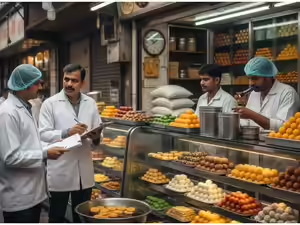Introduction
On Monday, the Rajasthan High Court issued numerous directives to the State and Central governments after taking suo motu attention to the growing issue of food adulteration.
Justice Anoop Kumar Dhand drew attention to the deficiencies in the Food Safety and Standard Act of 2006 and emphasized the absence of food testing facilities to closely examine the food manufacturing and processing sectors.
The Court noted that the food authority is underfunded, understaffed, and unable to keep up with the growing number of food enterprises.
Official Statement
“The food authorities lack the necessary technology to effectively monitor the situation at the ground level.” It stated that there are questions regarding the standard operating procedures that the numerous laboratories across the nation’s states adhere to when examining the products.
A public interest lawsuit was started by the Court suo motu on this background with the goal of “finding out the solutions for the good health of all the living beings.”
“Food adulteration is an increasingly recognized global public health problem. Having adulterated food is highly toxic and the same leads to several health issues including certain nutrition deficiency diseases, kidney disorders and failure of an individual’s organs including heart, kidney, liver, etc. Adulteration or contamination of natural food products is one of the major challenges in today’s society,” the Court underscored.
Court Statements
The Court stressed that Article 21 of the Indian Constitution shields individuals from dangerous and harmful food items. Additionally, Article 47 mandates that the welfare state guarantees the protection of specific rights for its citizens.
However, it stated that because unorganized sectors are not protected by the law, it does not offer a remedy to every issue.
“There are numerous gaps in the Act of 2006, thus it does not offer remedies to every issue. The Act of 2006 ignores the unorganized sectors. It has shopkeepers, hookers, and small manufacturers who make significant contributions to the unorganized sector. It focuses mostly on the processing sector. The Act of 2006 includes the primary sector, but it overlooks the agricultural sector responsible for producing primary food,” the Court said.
Additionally, it stated that the Ministry of Health and Family Welfare drafted the Food Safety and Standard (Amendment) Bill, 2020 because the Central government was aware of the circumstances.
The Court stated that the legislature knows why they have kept it in cold storage.
“The legislation is still in its early stages of implementation. And the problem is with how poorly it is being carried out. The laws are descriptive. It further stated that “to save the lives of all humans and living beings suffering from serious and life-threatening diseases caused by contaminated unsafe food, the Center and the State Governments are expected to take this issue of food adulteration seriously.”
Order
The Court gave the State and Center the following temporary directives in light of the gravity of the situation:
(a) The central and state governments ought to take the necessary actions to better carry out the Act of 2006;
(b) To determine where and when there are significant chances of adulteration in food goods, SFSA should identify high-risk locations. In accordance, the SFSA should routinely collect samples from those areas.
(c) The SFSA should make sure that test labs are available, with technical staff to manage them. And well-equipped testing infrastructures.
(d) The SFSA and District Authorities need to proactively sample items on a routine basis.
(e) At the state, district, urban, and rural levels, authorities should conduct periodic snapshot summary examinations.
(f) To evaluate the efforts made by the authorities in curbing adulteration, they should establish a State Level Committee. Which is led by the Chief Secretary and the Additional & Principal Secretary of the Health Welfare and Food Department. As well as a District Level Committee led by the respective District Collector.
(g) To raise public knowledge of the operation of the complaint mechanism and the duties of the food safety authorities, the Central government, State governments, and the relevant ministries should establish a website. The website will include a toll-free number and the Food Safety Officers’ contact information;
(h) By developing the complaint system, the central government, state governments, and their departments should keep an eye on compliance. And also unethical methods (if any) employed by the Food Authorities and their Officers;
(i) The government should actively implement ‘Sudh ke Liye Yudh’ in both letter and spirit.
(j) The State Government, the Food Authority, the Commission of Food, and other relevant parties should inform the public about the negative health effects of food adulteration through SMS, FM radio, television, newspapers, print media, electronics, and social media. They should also teach children about food adulteration by holding workshops and seminars in schools, among other venues.
Click here to read the Order in detail.
Bottom Line
The Court further ordered the authorities to produce compliance reports at the end of each month. Which should detail the procedures they are taking about sampling to check for food adulteration.
On July 30, they will hear the case again.
Source: TOI
 Food Manifest
Food Manifest 


















